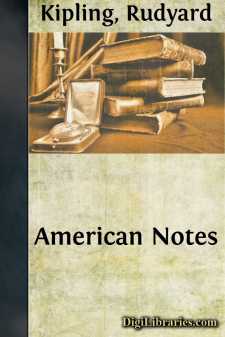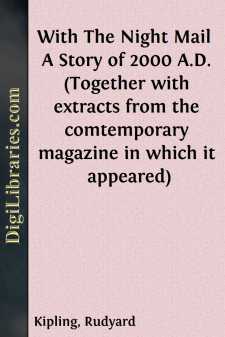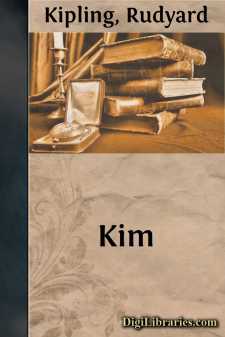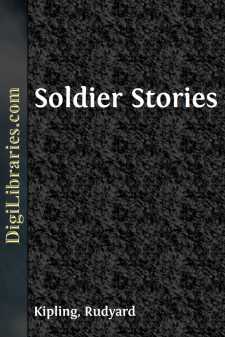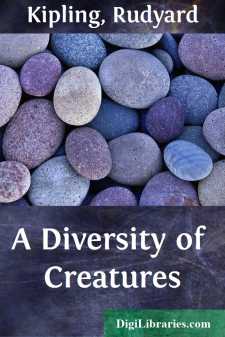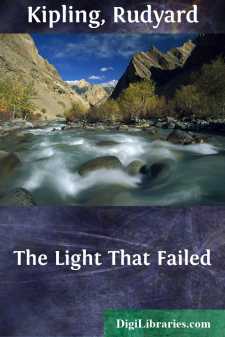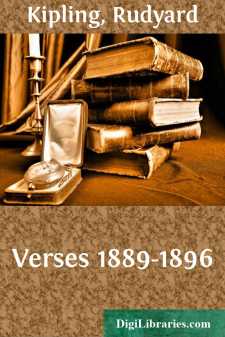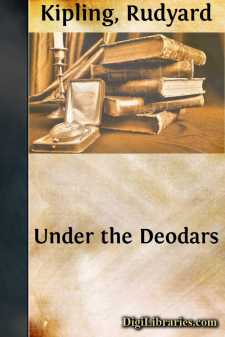Categories
- Antiques & Collectibles 13
- Architecture 36
- Art 48
- Bibles 22
- Biography & Autobiography 813
- Body, Mind & Spirit 142
- Business & Economics 28
- Children's Books 17
- Children's Fiction 14
- Computers 4
- Cooking 94
- Crafts & Hobbies 4
- Drama 346
- Education 46
- Family & Relationships 57
- Fiction 11829
- Games 19
- Gardening 17
- Health & Fitness 34
- History 1377
- House & Home 1
- Humor 147
- Juvenile Fiction 1873
- Juvenile Nonfiction 202
- Language Arts & Disciplines 88
- Law 16
- Literary Collections 686
- Literary Criticism 179
- Mathematics 13
- Medical 41
- Music 40
- Nature 179
- Non-Classifiable 1768
- Performing Arts 7
- Periodicals 1453
- Philosophy 64
- Photography 2
- Poetry 896
- Political Science 203
- Psychology 42
- Reference 154
- Religion 513
- Science 126
- Self-Help 84
- Social Science 81
- Sports & Recreation 34
- Study Aids 3
- Technology & Engineering 59
- Transportation 23
- Travel 463
- True Crime 29
American Notes
by: Rudyard Kipling
Categories:
Description:
Excerpt
Introduction
In an issue of the London World in April, 1890, there appeared the following paragraph: "Two small rooms connected by a tiny hall afford sufficient space to contain Mr. Rudyard Kipling, the literary hero of the present hour, 'the man who came from nowhere,' as he says himself, and who a year ago was consciously nothing in the literary world."
Six months previous to this Mr. Kipling, then but twenty-four years old, had arrived in England from India to find that fame had preceded him. He had already gained fame in India, where scores of cultured and critical people, after reading "Departmental Ditties," "Plain Tales from the Hills," and various other stories and verses, had stamped him for a genius.
Fortunately for everybody who reads, London interested and stimulated Mr. Kipling, and he settled down to writing. "The Record of Badalia Herodsfoot," and his first novel, "The Light that Failed," appeared in 1890 and 1891; then a collection of verse, "Life's Handicap, being stories of Mine Own People," was published simultaneously in London and New York City; then followed more verse, and so on through an unending series.
In 1891 Mr. Kipling met the young author Wolcott Balestier, at that time connected with a London publishing house. A strong attachment grew between the two, and several months after their first meeting they came to Mr. Balestier's Vermont home, where they collaborated on "The Naulahka: A Story of West and East," for which The Century paid the largest price ever given by an American magazine for a story. The following year Mr. Kipling married Mr. Balestier's sister in London and brought her to America.
The Balestiers were of an aristocratic New York family; the grandfather of Mrs. Kipling was J. M. Balestier, a prominent lawyer in New York City and Chicago, who died in 1888, leaving a fortune of about a million. Her maternal grandfather was E. Peshine Smith of Rochester, N. Y., a noted author and jurist, who was selected in 1871 by Secretary Hamilton Fish to go to Japan as the Mikado's adviser in international law. The ancestral home of the Balestiers was near Brattleboro', Vt., and here Mr. Kipling brought his bride. The young Englishman was so impressed by the Vermont scenery that he rented for a time the cottage on the "Bliss Farm," in which Steele Mackaye the playwright wrote the well known drama "Hazel Kirke."
The next spring Mr. Kipling purchased from his brother-in-law, Beatty Balestier, a tract of land about three miles north of Brattleboro', Vt., and on this erected a house at a cost of nearly $50,000, which he named "The Naulahka." This was his home during his sojourn in America. Here he wrote when in the mood, and for recreation tramped abroad over the hills. His social duties at this period were not arduous, for to his home he refused admittance to all but tried friends. He made a study of the Yankee country dialect and character for "The Walking Delegate," and while "Captains Courageous," the story of New England fisher life, was before him he spent some time among the Gloucester fishermen with an acquaintance who had access to the household gods of these people....


